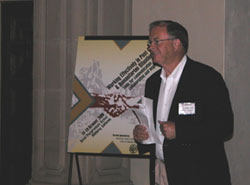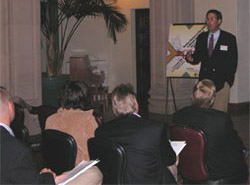In conjunction with the Naval Postgraduate’s School’s (NPS) Center for Stabilization and Reconstruction Studies, the Institute conducted our biannual course, “Working Effectively in Post-Conflict, Humanitarian and Reconstruction Situations,” October 15-19, 2006, at the NPS campus in Monterey, California.
 In conjunction with the Naval Postgraduate’s School’s (NPS) Center for Stabilization and Reconstruction Studies, the Institute conducted our biannual course, “Working Effectively in Post-Conflict, Humanitarian and Reconstruction Situations,” October 15-19, 2006, at the NPS campus in Monterey, California.
In conjunction with the Naval Postgraduate’s School’s (NPS) Center for Stabilization and Reconstruction Studies, the Institute conducted our biannual course, “Working Effectively in Post-Conflict, Humanitarian and Reconstruction Situations,” October 15-19, 2006, at the NPS campus in Monterey, California.
U.S. representative, Sam Farr and the Coordinator of the State Department’s Office of the Coordinator for Reconstruction and Stabilization (S/CRS), Ambassador John Herbst, gave the opening remarks at the welcoming reception held the evening of Sunday October 15th.
Congressman Farr and Ambassador Herbst both emphasized the need and urgency for such relationship-building workshops. Ambassador Herbst also described what S/CRS is doing specifically to bridge the interagency divide within the interagency in order to improve the civilian/military relationship on the ground in peace operations.
 Participants hailed from across the U.S. as well as Kosovo and Spain. The NGOs represented were Citizens Development Corps, Campaign for Innocent Victims in Conflict, Partners for Democratic Change, the Center for Humanitarian Cooperation, Toledo International Peace Center, Kosovan Nansen Dialogue, and Global Majority. There were participants from the U.S. Military Academy, Department of State, Defense Intelligence Agency, NATO, and the U.S. Army and Air Force.
Participants hailed from across the U.S. as well as Kosovo and Spain. The NGOs represented were Citizens Development Corps, Campaign for Innocent Victims in Conflict, Partners for Democratic Change, the Center for Humanitarian Cooperation, Toledo International Peace Center, Kosovan Nansen Dialogue, and Global Majority. There were participants from the U.S. Military Academy, Department of State, Defense Intelligence Agency, NATO, and the U.S. Army and Air Force.
The seminar’s objectives included professional skill development in the areas of conflict analysis, cross-cultural communication, negotiation, and third-party dispute resolution, all within the context of enhancing civilian/military communications in the field. The seminar involved presentations from leading experts in civil-military coordination in complex contingency operations. These presentations afforded opportunities for participants to hear new perspectives and to engage in rich discussion.



